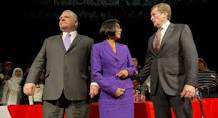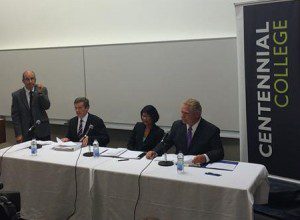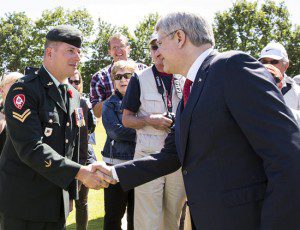
She started looking and listening from the moment she entered the room. Almost as if she were a bomb-sniffing canine, she was casing the space in which Olivia Chow was about to participate in a mayoral debate, Monday evening. I was the moderator and introduced myself. She had a raft of questions about where Ms. Chow would be sitting during the debate, and what the order of speaking would be. Then, just before her candidate entered the room, the handler approached me with one final question.
“How will Olivia know when her speaking time is up?” the woman asked me. “Have you got signs to count her down to the end of her time?”
“No.” I said. “I’ll just tell her she’s got 30 seconds left.”
“I really think you ought to have visual signs for her,” she insisted.
“Don’t worry. I’ve moderated a lot of debates. I don’t think we need visual signals. I’ll just find an appropriate moment, a breath pause in Olivia’s comments, and I’ll gently say, ‘Thirty seconds.’ It should work just fine.”
But this woman was just one of the candidate handlers I encountered Monday evening (Oct. 6, 2014) when I moderated a Toronto mayoral debate at the Scarborough campus of Centennial College. Candidate John Tory’s handlers wanted to know in what order the candidates would be scrummed (interviewed) by the media after the debate. And those who were handling Doug Ford’s appearance wanted to know how many members of “Ford Nation” would be allowed in the debating hall.
“First come. First served,” I told Mr. Ford’s handlers.

Handlers are an occupational hazard in the world of public relations. They are especially vital during political campaigns when the candidate who employs them depends on them for the best photo opportunity, the most advantageous speaking position and the best way to score points against opponents and/or to gain favour with the electorate. Sometimes handlers are highly paid campaign managers.
Other times they’re not paid at all, but so passionate about their boss that they’ll do just about anything for “the win.” I met handlers of all kinds over the past five months, as I negotiated with the three principal mayoral candidates in Toronto to participate in Monday’s mayoral debate at Centennial. And I never once spoke with Tory, Chow or Ford in all those weeks. I always dealt with handlers.
I knew I was in for a rough ride from the beginning, when one handler insisted – before her candidate even considered the debate – that I fill in a 20-question “Debate Invitation Information Form,” with answers to such questions as: Who’s invited? What’s the theme of the debate? What media are invited? How will the debate be run? What questions will be asked? How are the candidates positioned? What’s the order of delivering the remarks? And, how and where can the candidate’s campaign literature be displayed? I know that’s the sign of a strong organization. And I respected that. But five months out, I hadn’t thought about seating and specific debate questions. The only question on my mind was: Will s/he be there?
But that wasn’t the half of it. Last Monday afternoon, as I gathered my thoughts for the evening’s debate and ways to introduce the three candidates – Chow, Ford and Tory – I found myself facing yet another handler. Actually, he was a candidate who handled himself. During recent weeks of the Toronto mayoral campaign, he had emerged as a new challenger at about five or six per cent in the popular polls. He felt – above all of the other fringe candidates – that he deserved to be the fourth participant in our Monday night debate. And he confronted me at the debating venue to say so. Fortunately for the Monday night debate, I managed to convince this handler to back off.

I’ve dealt with handlers at every level of government – from rabid youthful volunteers who believe that part of their job is to tear down the lawn signs of the opponents, right up to public relations people who handle the Prime Minister’s events. One of them, for example, stopped me last June in the middle of Beny-sur-Mer, the Canadian cemetery near Juno Beach, to say that her boss, Stephen Harper, was about to arrive and if I (and my tour group of about 50 people) would like, we could be part of the audience as the PM laid wreaths at the cemetery cenotaph. That’s when an idea struck me.
“OK,” I said to the handler, “provided the veterans and others in my tour group got a chance to meet the Prime Minister.”
It seemed a reasonable enough request. And when the PM finished his wreath-laying duties, indeed he met the vets and others in my travel group and they all got their picture taken with him. Sometimes, the only way to handle handlers is borrow their tactics.